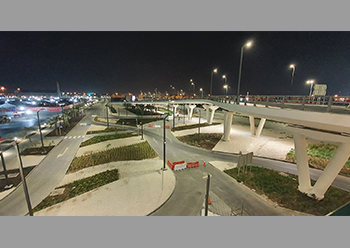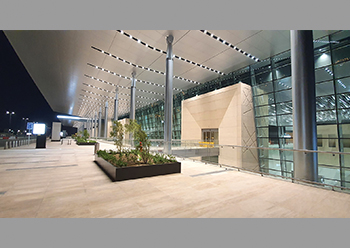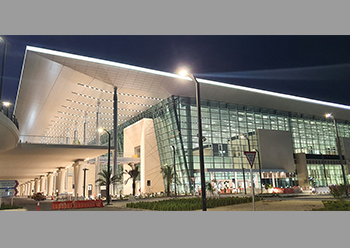Bahrain airport Phase Two expansion to start
Project and construction management firm Hill international highlights the work that has been carried out as part of Bahrain International Airport’s expansion as it gears up for the next phase of construction under the airport modernisation programme.
01 November 2020
Hill International says it is getting ready to start work on Phase Two of the Bahrain International Airport expansion, having handed over the first phase of the project in August.
The global project and construction management firm is providing project management services for the Airport Modernisation Programme (AMP).
With a targeted completion date of October 2021, the primary scope of works on the second phase of this iconic development will be demolition of certain sections of the old terminal building to facilitate the extension of the new terminal building concourse and works at the landside areas, Sharif Makki, Hill’s Director of Operations and Contracts Manager for the project, told Gulf Construction.
In mid-August, Hill International managed the handover of the first phase of works for the $1.1-billion airport development programme, marking a new milestone for Bahrain’s aviation industry that will enable it to increase passenger handling capacity at its rebuilt and refurbished airport to 13.5 million per year from the current nameplate of 9 million per year.
 |
|
The airport development programme entailed drawing up an entire site plan with airside and landside facilities. |
The first phase of the project was centred on the construction of a new 210,000-sq-m terminal featuring premium-class check-in halls, check-in desks, passport control booths, E-gates, security lanes, a 9,000-sq-m duty-free retail space, premium-class lounges, food and beverage zones, 24 departure gates, and 7,000 new parking spaces both at-grade and in multi-storey facilities.
The Ministry of Transportation and Telecommunications (MTT) and Bahrain Airport Company (BAC) acted as the client’s representative for the airport development programme that entailed drawing up a new masterplan to assess future needs and an entire site plan with airside and landside facilities, said Uzair Wasif, Hill International’s Vice President and Project Director for the airport project.
He added that the MTT brought on industry experts who recognised that to achieve the project’s goals for the long term, the existing facility had to be decommissioned and a new terminal constructed.
“In 1932, the first commercial aircraft arrived in Bahrain from London, heading to Delhi with 24 passengers, making Bahrain the first GCC country to operate a commercial international airport,” he said. “To keep pace with aviation industry developments, Bahrain opened a new passenger terminal known as Bahrain International Airport in 1961. The new terminal recognises that legacy, but with all of the technology, amenities, and capabilities today’s travellers and airlines expect.”
 |
|
The first phase centred on the construction of a new 210,000-sq-m terminal. |
Focus on project execution
The process of turning a newly constructed facility into a fully functioning airport needs to be carefully managed. To oversee preparations were implemented as planned, the project steering committee was formed in the initial phases of the programme to enhance coordination among various stakeholders.
In the early stages, Hill’s management priorities focused on the procurement of construction and engineering speciality packages. Five packages were critical to meeting Phase One’s handover date, Wasif said, noting the team procured these packages on a design-build basis, which used a traditional design-bid-build delivery method, prior to the award of the main contract. The five design-build packages were: Baggage Handling System (BHS), Information and Communication Technology (ICT), Security and Screening Equipment (SSE), Passenger Loading Bridges (PLB), and Horizontal/Vertical Transportation Systems (HVTS).
Structuring the programme’s procurement this way provided greater schedule control and took advantage of the design-build delivery method by aligning the risks of these intricate systems with teams who understood how to best realise these packages on time and within budget. “Design-build procurements always involve a trade off in control,” explained Wasif. “The owner exchanges a degree of control, while the contracting and design team assumes more of the risk. For the ICT and BHS packages in particular, this trade made perfect sense for our project.”
As the project manager, Hill International was responsible for the development of the performance criteria for these specialty packages, with each package outlining the needs and requirements for the programme.
“The benefits of this early procurement enabled tighter control of the project’s timeline,” Wasif said.
The project required a high level of coordination among many stakeholders to maintain progress. These stakeholders included government ministries, authorities, ground handlers, operators, airlines, and duty free, among others, each with its own requirements. To address stakeholder concerns, Hill identified the requirements, challenges, expectations, timelines, and programming of all major stakeholders early in the project process, codified this data, and used it to drive decision-making and keep the project moving.
“Major infrastructure programmes can have delays due to necessary stakeholder-driven changes,” said Makki. “This happened with the Bahrain project, but early efforts to account for and consider the needs of our stakeholders helped to mitigate these impacts.”
Covid-19 impact
The Covid-19 pandemic presented several challenges; on site, this meant ensuring proper personal protective equipment (PPE) was always available and in use, and that labourers were screened for symptoms daily before beginning work. This helped to protect the workforce and minimise the risk of the virus spreading. From a planning and management perspective, Hill coordinated with the MTT, BAC, vendors, and contractors to find workarounds to supply chain bottlenecks and to maximise work during available hours.
“Much like the entire aviation industry, we had to adapt quickly to the new normal of Covid-19. We needed to make certain we were doing everything we could to help keep the project moving,” Makki said.
To ensure the safety and wellbeing of passengers and staff at the new facility, BAC is meticulously checking the operational readiness of the Phase One facilities. To oversee preparations were implemented as planned and keep the project on track, the National ORAT Steering Committee, which was formed as per Royal Order (10) for 2017, issued by His Royal Highness Prince Salman bin Hamad Al Khalifa, Crown Prince, Deputy Supreme Commander and First Deputy Premier, met regularly to address key issues.
The new terminal is ready and Hill International has left its mark behind in Bahrain’s aviation sector, Wasif said.



